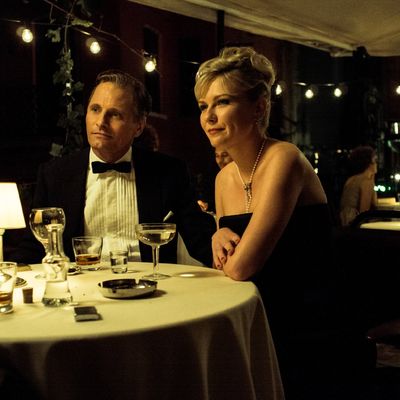
In Hossein Amini’s handsomely mounted The Two Faces of January, the Aegean sun shines harsh and bright on the duplicitous characters, like a celestial interrogation. An adaptation of a Patricia Highsmith novel, the film, set in Greece and Turkey in the early 1960s, brings together three Americans: elegant couple Chester and Collette McFarland (Viggo Mortensen and Kirsten Dunst), and Rydal (Oscar Isaac), a well-educated tour guide who lives in Athens impressing female tourists with his smoldering looks and bountiful knowledge of the local ruins.
But Chester and Rydal are both hustlers, of a sort. The latter overcharges and seduces his tourists and skims off the top of any exchange, while the former has fled from some powerful people for whom he lost a lot of money. When Chester’s past catches up to him, Rydal offers to help the couple flee. What’s the younger man’s angle? Is it a chance at the lovely Collette? Is it the promise of finagling more money out of Chester? Or is it that he’s drawn to this figure who reminds him of his late, estranged father?
Much of Highsmith’s work (The Talented Mr. Ripley, Strangers on a Train, etc.) turns on the fragility of identity, with the suspense often teasing out her characters’ existential unease. This time, however, it’s how the characters see each other that changes. Rydal has left his past in America behind, we’re told; he didn’t even attend his father’s funeral. That explains his initial fascination with Chester. But as the story develops, the younger man’s bond to the older one grows darker, even slightly sadistic. As he becomes less and less of a father figure to Rydal, Chester himself starts to see the kid more and more as a son.
There’s a lot to chew on here: Isn’t this kind of alternating co-dependency, in many ways, what happens between parents and children? And what about the film’s Oedipal overtones: If Chester is somewhat like a father to Rydal, then what’s Collette, whom the young man clearly covets? Unfortunately, any broader resonance is lost amid the busywork of telling a not particularly gripping tale. I haven’t read Highsmith’s novel, so I can’t speak to the film’s fidelity to its source material. But as Amini dutifully ticks off the plot points, we get little sense of gathering danger, or urgency. The film sure looks great, though; we get lots of picturesque locations and loads of local color. Ideally, as in prior Highsmith adaptations like Purple Noon or The American Friend, all these elements — suspense, narrative, character detail, atmosphere — should work in tandem. Here, it’s a case of diminishing returns: gorgeous, occasionally evocative, but, in the end, mostly dull.


